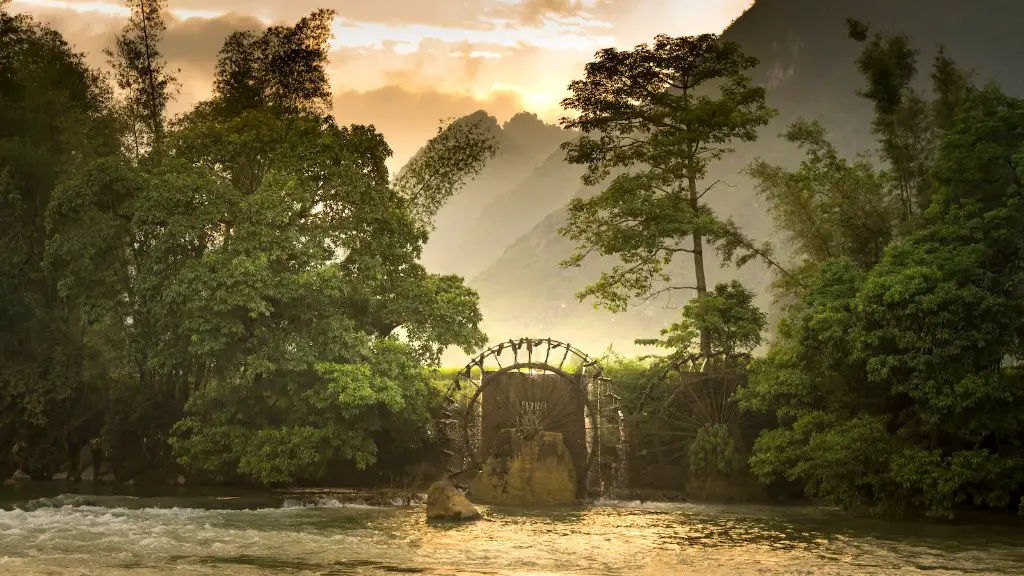Environmental Impact
The Nile River was vital to ancient Egypt as it provided life-sustaining natural resources such as freshwater, canals, fish, and mud. The River’s predictable flooding allowed for lands to become suitable for crop cultivation, resulting in increased agricultural production. The Nile also served as a transportation route which enabled trade and commerce. As a result, people were able to engage in bartering, exchanging goods and services between different communities and regions.
The freshwater of the Nile was used for many purposes, most prominently drinking and irrigation. The quality of fresh water was exceptionally important, since most of the dirt and debris related to crop production and manufacturing would come from it. Ancient Egyptians were well aware of the importance of clean water and established a system for controlling its use in order to preserve its quality and ensure its safety for human consumption.
The water of the Nile also allowed for significant soil fertility, as the deposits formed from the annual flooding enriched the soil and made it suitable for growing a variety of different crops. Ancient Egyptians heavily relied on the soil of the Nile River Basin to sustain their agricultural production and had well-developed methods for fertilizing, cultivating, and harvesting the rich soils. The river was also a source for fishing and farmers used the mud from the Nile to build dikes and irrigation canals.
Economic Impact
The economic benefits of the Nile can hardly be understated. Ancient Egyptians heavily traded commodities and goods carried by the river and its canals. In particular, trading of gold, ivory, timber, food, spices, and pottery were all common on the Nile. The Nile was also a source of transportation, as it connected different cities and regions, providing economic stimulation and opportunities.
The annual flooding of the river increased agricultural production, which helped Egypt to become self-sufficient and allowed a surplus of food to be traded with other civilizations and nations. The resulting rise in GDP and development of Egypt’s port cities powered the economy. In addition, the abundance of surplus food from agricultural production enabled Egypt to increase its population which led to further economic development and the establishment of an extensive system for taxation, government revenue, and strong economy.
Political Impact
Aside from its economic implications, the Nile River also had profound political consequences for Ancient Egypt. One such impact was the creation of centralized government. Since the Nile provided all of Egypt’s resources, the country organized itself around the river. This resulted in the centralization of power, making the Egyptians one of the first civilizations to practice a form of representative government.
The Nile allowed for many different cities and regions to be connected, and this enabled a powerful central government to collect revenues from each. This allowed the government to setup a defense system, creating the first military of its kind in the region. Furthermore, this was a major factor in creating the earliest standing armies.
Religious Impact
The Nile River was also an important religious figure in Ancient Egypt. The Egyptians believed that the Nile was an aspect of the god Hapi and had a direct connection to their gods Osiris, Isis, and Horus. To the Egyptians, the Nile personified the cycle of life and death and its annual flooding was believed to have represented the death and rebirth of gods.
This belief was so important to the Egyptians that it helped convince them to move closer towards religion, with the gods being seen as the source of the river, who provided water and food for sustenance and fertility. This helped the ruler of Egypt to solidify their power and encouraged people to follow the social structure of ancient Egypt by devoting themselves to their leaders and gods.
Social Impact
The Nile River was also hugely important to the Ancient Egyptians due to its social benefits. As a major source of life-sustaining freshwater, the Nile allowed for the growth of major cities and helped to promote the development of a strong and stable government system.
The Nile also enabled the formation of strong trade relationships with nearby countries, which allowed for the spread of different cultures and ideas among civilizations. On the other hand, it caused the immigration of different people from foreign lands, therefore introducing a variety of ethnicities and cultural practices in Ancient Egypt.
Not only was the Nile vital for providing quality water and food, but it also allowed for a variety of activities such as hunting and fishing, which provided entertainment and relaxation for the people. Moreover, it facilitated the development of festivals and religious ceremonies that were based on the flooding of the river.
Artificial Intervention
The impacts of the Nile extended to artificial intervention as well. Ancient Egyptians heavily utilized the river’s resources, especially its water. To control the waters of the Nile and direct it towards their own agricultural lands, they built many dams and artificial reservoirs.
Furthermore, the Nile was artificially deepened to enable boats to navigate farther upstream. Egyptians also built irrigation canals which allowed them to send water to otherwise arid areas for agriculture. The result of all of this was increased agricultural production and a boost in the self-sufficiency of the Ancient Egyptian civilization.
Ecological Impact
The Nile had also a significant negative ecological impact. Due to the artificial components that were introduced such as dams and canals, the natural flow of the river had suffered, leading to increased soil depletion, deforestation and soil erosion.
Not only that, but due to the intense agricultural production taking place in the Nile Valley, many of the plants and animals were pushed away from the river. The species that managed to survive the introduction of human activities were forced to adapt to the changing conditions and as a result, the biodiversity of the river’s ecosystem had suffered greatly.
Cultural Impact
The Nile was integral to the formation of Ancient Egypt’s culture. From ancient hieroglyphics to prehistoric artifacts, the Nile has historically been the muse of many writers, historians and artists alike.
The Nile had also served as inspiration for many poeticians and writers. The famous Egyptian writer, Anwar al Sadat, wrote extensively about the Nile, its importance and its role in Ancient Egyptian civilization. The river was also a major figure in Ancient Egyptian architecture, as many structures were designed around it and inspired by it.
Moreover, the Nile was a significant factor in the development of Ancient Egypt’s religion. As the Egyptians believed that the river was a divine gift from their gods, the river became associated with many religious ceremonies and rituals, thus preserving Ancient Egypt’s legacy and culture.
Evolution Over Time
Despite its significance, the importance of the Nile has decreased significantly over time. As the population of Egypt increased and modern technologies were introduced, the river has become less integral to the life and well-being of Ancient Egyptians.
The River’s influence on the economy can still be felt, though the rise of more efficient production methods and transportation has led to a decrease in the number of boats and barges travelling down the river. In addition, most of the canal networks have been abandoned in favor of less labour-intensive modes of transportation, reducing the Nile’s role in trade and commerce.
Agriculture has also been affected, since many of the canals and irrigation systems have become obsolete. Modern irrigation techniques are now used to increase crop production, eliminating the need for natural flooding. And due to environmental regulations and improved sanitation, the quality of the water has vastly improved too.
Impact on Modern Day Egypt
Despite the decreased importance of the Nile in modern times, it is still an integral part of Egyptian culture and identity. The River continues to provide fresh water, electricity, and transportation routes. It is now used as a means of tourism and recreation, as well as a source of energy and food production.
The importance of the Nile to the Egyptian people remains strong, as it holds a great historical significance for their culture and civilization. Though much of Ancient Egypt’s technology, culture, and religion has faded away with the passing of years, the connection between the people and the river that gave them so much has remained.


